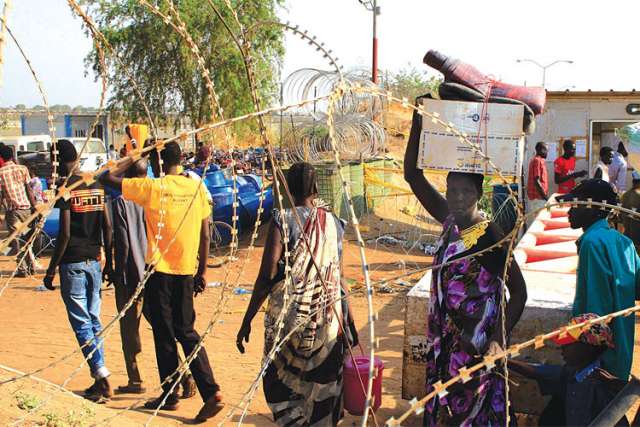South Sudan is the newest country in the world, an independent African nation since 2011. Yet few of us have even heard of it. Soon it could become a household name for all the wrong reasons.
As conflict rages within its borders, the young nation teeters on the brink of famine. The United Nations recently declared the food crisis there the worst in the world. It is a crisis the world has all but ignored at a time when the South Sudanese need us most.
In a country of 10 million, one-tenth of the population is in a state of emergency where food is scarce, acute malnutrition is common and the future outlook for food is dismal or non-existent. The food reserves of another 2.4 million people are dwindling rapidly.
The looming famine is a manifestation of the tragedy of South Sudan. After fighting 20 years for independence, the country’s leaders have turned on each other. Since December fighting between supporters of President Salva Kiir and former Vice President Riek Machar has intensified. The two men are standard bearers for different ethnic groups. The ethnic fighting has led to internal displacement of one million people, creating 425,000 refugees and an estimated four million South Sudanese in need of aid.
People have been finding refuge at makeshift UN camps, schools, hospitals and churches. Others have simply fled into the woods, surviving on whatever the forest has to offer.
Subsistence farming sustains 85 per cent of the population. If people can’t plant crops there will be no food in the coming year. The rainy season, normally welcomed, has added to the misery by spreading cholera, making crowded camps unbearable and remote regions inaccessible to aid.
When South Sudan became independent there was a brief spark of hope. People who had known despair, heartache and poverty for so many years finally had an opportunity to build a nation founded on democracy, accountability and peace. But those hopes and livelihoods have been shattered and many are now at critical risk of starvation after being caught in the crossfire of this brutal conflict.
The people of South Sudan fought to free themselves from a government that did not represent them. But their new leaders are continuing a tradition of broken democracy and committing atrocities against each other. The promise of an inclusive government that believes in the common good is all but lost.
Peace talks between South Sudan’s leaders falter and the dark shadow of ethnic violence and famine gets longer by the day. It is time for the international community to show the South Sudanese they are not forgotten. We cannot look away as a nation and its people are pushed towards disaster.
Humanitarian aid is only the beginning. The people of South Sudan need to know we share the belief that they can build a great nation. We must support them as they transform their country from the ground up, lifted by the solidarity of fellow global citizens.
The Canadian Catholic Organization for Development and Peace has been in South Sudan for more than 25 years. We were there through the transition to independence and the years following. We have been working with the local Church — with its wide outreach in this mostly Christian country — to promote peace, tolerance and good governance. Now we will stand by them in this crisis.
Hopes for a peaceful future are not completely lost. The bishops of Sudan and South Sudan wrote after violence broke out:
“We are convinced that we stand at a decisive moment in South Sudan. Fundamental choices must be made about how we deal with our past and present history, about how we govern ourselves as a nation, about how state institutions serve the poor. We must seize from the present crisis an opportunity to re-found our nation on democratic principles of dialogue, inclusion and respect for diversity, God’s gift to humanity.”
As part of the global Church, it is our role and duty to support the endeavour of forgiveness and healing — essential foundations of democracy. Canada and the international community must pressure South Sudan’s government to protect its citizens, regardless of ethnicity, and bring to justice those responsible for abuses of basic human rights.
The people of South Sudan deserve to live in peace and in dignity. That responsibility is held by the country’s leaders, but also by the world, which must let the people of South Sudan know they are in our hearts.
(Casey is the executive director of the Canadian Catholic Organization for Development and Peace.)


